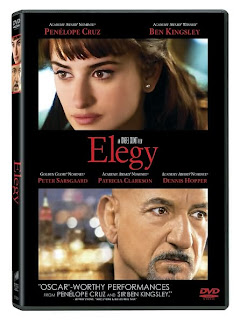 Elegy is one of the few movies I've seen that's based on a book that I've actually read; it comes from Philip Roth's novel The Dying Animal...which, sadly, I don't remember well enough to be clear on the ways it differs from the movie. I have the sense that the feel of the two are very similar, but some of the details in the movie seemed faintly off -- not wrong, exactly, but different.
Elegy is one of the few movies I've seen that's based on a book that I've actually read; it comes from Philip Roth's novel The Dying Animal...which, sadly, I don't remember well enough to be clear on the ways it differs from the movie. I have the sense that the feel of the two are very similar, but some of the details in the movie seemed faintly off -- not wrong, exactly, but different.Ben Kingsley is David Kepesh, a professor of English at Columbia and a medium-rank literary lion; his best friend is his colleague, the poet George O'Hearn (played by Dennis Hopper). It's only implied in the movie that, at the end of every semester, he seduces one of his female students, though Kepesh (the narrator of both versions) admits that readily in the novel.
And his conquest this time around is Consuela (Penelope Cruz, looking gorgeous as ever but slightly too old to be an undergrad). She, however, both gets under his skin -- so that he doesn't want to move on -- and sees something of interest in him herself. So their relationships stumbles on for a while, undermined by Kepesh's neediness and disbelief, as O'Hearn acts as the Greek Chorus telling Kepesh to break it off while he has some dignity left. (And, meanwhile, Kepesh has a longstanding sex-only relationship with high-flying businesswoman Carolyn -- Patricia Clarkson -- who drops in on him for a booty call whenever she's in town but, strangely or obviously, becomes possessive herself once it seems that Kepesh has another woman in his life.)
Elegy moves at a deliberate pace over a timeframe that's left somewhat vague -- several years pass between the two ends of the movie, but their passing is not the point. There's not a lot of plot per se, but Kepesh and Consuela's [1] relationship goes through a number of changes.
This is not a romantic comedy, so the ending has more possibilities than that more constrained form. And the title -- both of the original novel and of the movie -- hint that it will not be a happy ending. But that change in title is intriguing: The Dying Animal clearly refers to Kepesh, while Elegy is less specific.
It's a quiet, thoughtful, moving film, with strong performances from all of the people I mentioned above. And, for those with tastes like myself and The Wife, there's a particularly lovely shot of a recumbent Cruz about halfway through.
[1] Yes, I know that I'm calling the man by his last name and the woman by her first name; this is deliberate, since the movie sees them in essentially those terms and that difference in power is important to the story.
No comments:
Post a Comment